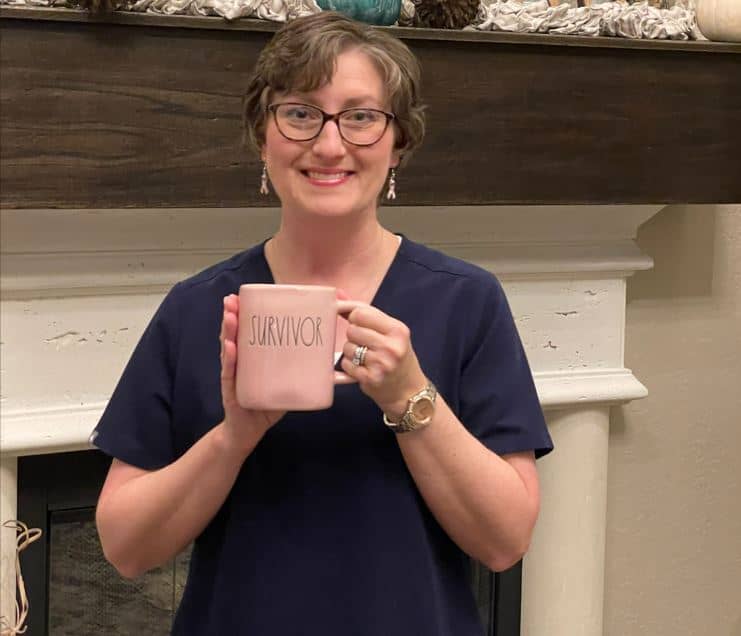
For Tammy Kapplinger, adding a nurse navigator to her breast cancer care team helped alleviate the fear of the unknown. In January 2021, Tammy was diagnosed with stage 1B triple negative invasive ductal carcinoma.
Breast cancer screening and early detection play an important role in breast care. Regular screening tests can help detect breast cancer at an early stage when the chances of survival are highest.
“The office called me and said my mammogram had shown some microcalcifications, a small cluster. I didn’t think that sounded like a big deal,” Tammy said. “I’m in my 40s, I’ve got arthritis in my joints, I thought maybe it’s something like that in my breast.”
Tammy’s follow-up included a diagnostic mammogram and an ultrasound, which ended up being postponed because of a winter storm. “I had that hanging over my head for two-and-a-half weeks. When I finally got in, the radiologist said there was something there and I needed to get a biopsy.”
The appointment fell during her daughters’ spring break. “They were nine and 11 at the time, it was almost St. Patrick’s Day, so I told them I was going in for pinch. I said they found something on the picture of my chest and that’s why we go to well visits, to see if everything is okay.” Tammy kept the girls – and herself – busy until it was time for her appointment.
A Breast Cancer Diagnosis & Treatment Plan
“Two days later, I’m doing my charting at the office where I work and I got a phone call from the nurse practitioner. She said, ‘Tammy, we’ve got the results, you have breast cancer.’ That’s just not something you expect to hear over the phone.”
Stunned, Tammy started writing down notes. “Your brain kind of shuts down. I know I was listening and I was writing notes, very ‘okay, what’s the next step?’” Tammy is a physician assistant in a pediatrics office, and the medical side of her kicked in. “I wanted to know what’s next, I kind of went into fight or flight mode.”
The next phone call was from the radiologist, confirming Tammy’s diagnosis: triple negative invasive ductal carcinoma. She was going to need an oncologist and a breast surgeon. “I didn’t know what all I was up against, but I knew I was going to need to start making appointments. At that point, the radiologist told me something that really changed everything – she told me I was going to need a nurse navigator.”
Working With a Nurse Navigator
The radiologist told Tammy a nurse navigator would help her with making appointments and understanding everything that was going on. “She said she’d help me get through this,” Tammy said. “It was such a relief, knowing I wasn’t going to do this alone. Of course, I had my family there with me every step of the way, but just knowing someone was going to hold my hand a bit and help me with the appointments was incredible.”
A nurse friend told Tammy that invasive ductal carcinoma was easy to treat. But Tammy had read her biopsy results and knew the cancer was triple negative, meaning it was aggressive and likely to recur.
“I just cried and cried, and that was the day I decided to call the nurse navigator and make an appointment. I told her I couldn’t stop crying and needed someone to help guide me a little bit and calm me down,” Tammy said. “She told me, ‘I’ve seen people with triple negative breast cancer before. You’re young. You’re strong. This is not a death sentence.’”

Treatment
Tammy’s treatment included chemotherapy. For two months, she would go every two weeks, followed by injections the next day to help boost her blood cells. The next three months, she received chemotherapy weekly.
Once Tammy completed chemotherapy, she had a bilateral mastectomy with reconstruction. “I had a bilateral mastectomy because I didn’t want to worry about something coming back in my other breast,” she said.
For someone newly diagnosed or in the midst of treatment, Tammy recommends reaching out to a navigator. “They’ve been across from someone in your shoes many times. They’ve held the hands of women and men with breast cancer and are there to guide you. If I had trouble getting an appointment, my nurse navigator stepped in,” Tammy explained. “She was there to help me remember to take care of myself. She was a sounding board. I trusted her from day one and she was an important part of my team from day one.”
Finding Support
Tammy’s nurse navigator also led her to joining a support group she co-facilitates. “Being in the support group was so important for me,” Tammy said. “Not everyone understands what you’re going through with a breast cancer diagnosis. In the group, they understood.”
Last year, Tammy was asked if she’d be interested in being the new facilitator for the group. “I said yes and the group has been so helpful for me. I’m excited to pass along what I’ve learned, and to be there for these women.”
If you or someone you know needs support, Komen’s Patient Care Center navigators are available to provide free, personalized navigation services to patients, family members and caregivers no matter where they live in the U.S. or its territories.
Komen’s navigators are a trusted source for timely, accurate breast health and breast cancer information, services and resources. Connect with a Komen navigator through the Breast Care Helpline at 877-GO KOMEN or helpline@komen.org. Learn more.
Statements and opinions expressed are that of the individual and do not express the views or opinions of Susan G. Komen. This information is being provided for educational purposes only and is not to be construed as medical advice. Persons with breast cancer should consult their healthcare provider with specific questions or concerns about their treatment.



